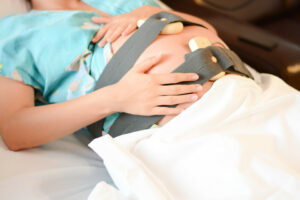Obstetric cholestasis
Ali Pickles, Registered Midwife from The Healthy Mummy Pregnancy team, shares some information about Obstetric cholestasis:
Be very careful googling the topic of cholestasis as obstetric cholestasis is different to that of permanent cholestasis not caused by pregnancy. ‘Dr Google’ can sometimes cause more issues than good.

What is obstetric cholestasis?
Like other obstetric complications pregnancy hormones also cause this. The hormones (oestrogen) upset the liver, slowing or stopping the flow of bile into the intestines.
What is bile’s role? Bile assists the breakdown of foods after digestion and helps the body absorb nutrients. When the liver slows, decreasing the release of bile, toxins build up in the bloodstream causing obstetric cholestasis. The livers role in our bodies is to work to detox our systems.
1% of women are affected by obstetric cholestasis, which generally occurs in the third trimester but can occur at any time. Research suggests it is a genetic condition and generally affects mothers and sisters.
Mothers who descend from Asian and South American backgrounds also have a higher incidence. If you have had liver disease such as hepatitis, alcohol abuse or infections affecting the liver you are also at an increased risk.
If you had obstetric cholestasis in your first pregnancy it usually repeats for subsequent pregnancies.
Symptoms
- Excessive itching. Generally starting on the palms of the hands and soles of the feet. It’s itchiness under the skin that does not appear as a rash or irritation to the skin. It worsens at night.
- Jaundice or yellowing of the skin and eyes can also occur. At first it may seem like you’re a little tanned but if it’s winter that is not possible. Jaundice is caused by the build up of bilirubin, a pigment caused by the slowdown of bile production.
- Your urine may be darker in colour, which may not be noticeable if you are taking vitamin supplements. The build up of liver enzymes can also cause urinary tract infections.
- Stools ‘poos’ may also be darker than normal.
Diagnosis
- If you have any of the symptoms above especially itching, speak to your doctor or midwife.
- Blood tests will check for liver enzymes via a liver function test.
- Some doctors will also do an ultrasound of the gallbladder to check for gallstones as this can also cause a bile blockage.
Concerns
- Bilirubin can cause severe vitamin deficiencies so it is important to maintain supplements. You may also need regular blood tests to determine which ones require extra supplements.
- Some itchiness of the skin is normal due to the hormonal changes so don’t think because you’re itchy you automatically have obstetric cholestasis.
- Having obstetric cholestasis can put you at higher risk for bleeding post having your baby. This is because of a deficiency in Vitamin K. Vitamin K assists with blood clotting.
- The baby may also have a Vitamin K deficiency however babies are given Vitamin K shortly after birth anyway.
- Sleeping can be difficult because the itch worsens at night so try getting some naps in during the day and sleeping with a fan on to cool the skin.
- Depending on the severity some women may find they are admitted to hospital for closer observation of both themselves and their baby.
Treatment
- Giving birth is the main cure however depending on your gestation this may not be possible just yet.
- Some doctors will prescribe steroids for the mother and give a steroid injection to help strengthen the baby’s lungs.
- Chinese herbalists have been used with good effect also.
- Ursodeoxycholic acid – a natural bile supplement that boosts liver function and helps decrease the itching. It’s completely safe for the baby.
Does it affect the baby?
Due to the decreased amount of oxygen in the mother’s blood crossing the placenta there is an increased risk on the baby.
Doctors and midwives will monitor you pregnancy more closely. Due to the stress on the baby, women with obstetric cholestasis are generally induced between 35-38 weeks depending on the severity.
Preventing a stillbirth is most important to the doctors. Frequent ultrasounds and heart rate dopplers will be performed. Babies can be jaundiced post birth and may need phototherapy in the special care nursery.
Nutrition
- Have a well balanced diet and omit fatty and fried foods.
- Any food that puts extra strain on the liver is best to be avoided.
- Drink plenty of water.
- Dandelion root tea is a natural detox but is best to have only a couple of times a week as even though it’s said to have benefits in pregnancy there isn’t a lot of research to support this.
- Eat foods that help the liver
- Ginger
- Dark green leafy vegetables
- Beetroot
- Carrots
- Lemons
- Garlic
- Black walnuts
- Milk thistle
- Mint
Ways to manage itching
(not evidence based but anything is worth a try)
- Wearing light, loose cotton based clothing that breathes.
- Using creams that contain oatmeal or calendula (avoid oil based/ perfumed ones).
- Calamine lotion.
- Cool packs where itch is worse.
Ali Pickles, Midwife
Click here to visit our pregnancy products shop
Disclaimer: Always speak to your doctor before changing your diet, taking any supplements or undertaking any exercise program in pregnancy. The information on this site is for reference only and is not medical advice and should not be treated as such, and is not intended in any way as a substitute for professional medical advice..
Our plans promote a health weight gain in pregnancy to benefit the mother & baby and you can read more on this here
The owners of The Healthy Mummy do not make any representations or warranties, express or implied and shall have no liability or responsibility to any person or entity with respect to any loss or damage caused or alleged to be caused directly or indirectly by the information contained herein and nothing in this disclaimer will limit or exclude any liability for death or personal injury resulting from negligence, limit or exclude any liability for fraud or fraudulent misrepresentation, limit any liabilities in any way that is not permitted under applicable law or exclude any liabilities that may not be excluded under applicable law.




